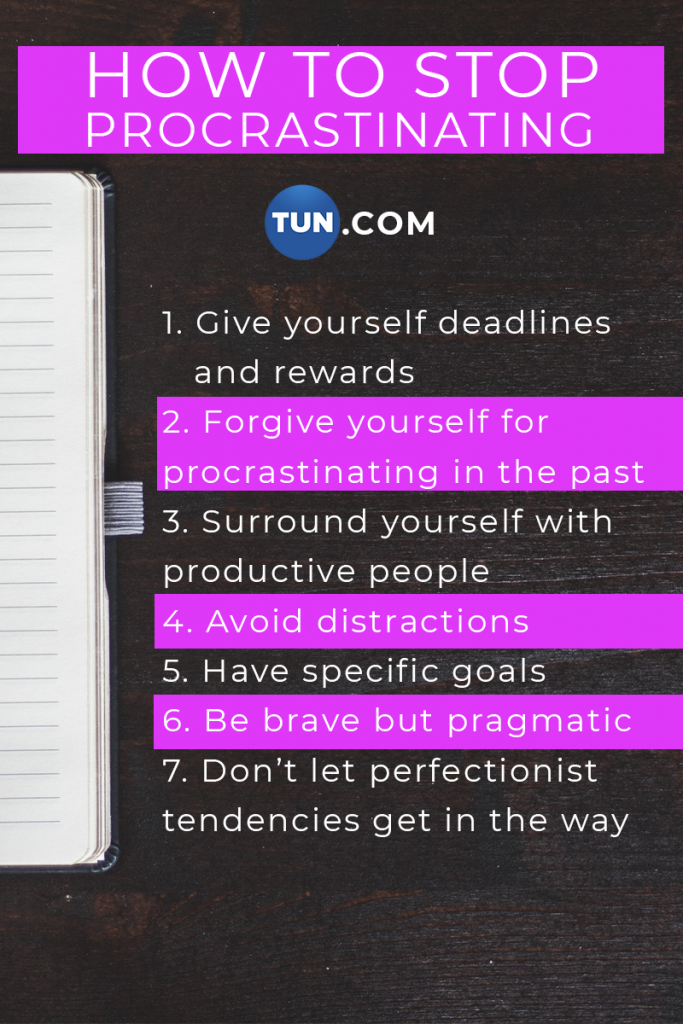Everyone has their own unique approach to studying and completing assignments. There are night owls, morning birds, marathon studiers, sprinters, and the list goes on. Each specific study style and approach is valid. But one thing is for sure. If you’re routinely waiting until the last minute, you’re not maximizing your academic potential.
This article dives into the psychology behind why we procrastinate and offers tips to help you stop procrastinating.

Why do we procrastinate?
The answer isn’t as simple or universal as you might think. It may sound dramatic, but procrastination is much more complex than pure laziness.
“People throw around the term procrastination frequently, but it’s very real and has very real consequences,” said Dr. Joseph Ferrari, a professor of psychology at DePaul University.
“Procrastination is a tendency to delay the start or completion of a desired task to the point of experiencing discomfort,” he added. “It leads to dysfunctional ways of being and a reduced quality of life. Procrastination is not the same as waiting, postponing, or delaying.”
While some research suggests that somewhere between 80-95 percent of students may procrastinate, Ferrari suggests that as many as one in five people are chronic procrastinators.
“We all put things off,” William McCown, associate dean of the College of Business and Social Sciences and professor of psychology at the University of Louisiana at Monroe, told the American Counseling Association (ACA). “But when we put off things that are really in our best interest to complete and we do it habitually, then that’s more than just a bad habit or a lifestyle issue.”
There are all types of hindering factors that may influence your ability or desire to complete your work in a timely manner.
While procrastination has long been thought of as a product of poor time management, a growing body of research suggests that poor emotional management plays a bigger role.
Rachel Eddins, a licensed professional counselor who runs a group counseling practice in Houston, told ACA that some of the most common reasons that people procrastinate include a fear of failure, frustration, self-doubt, and an aversion to a certain task. She said that procrastination can be a result of various mental health issues, including ADHD, eating disorders, perfectionism, anxiety, and depression.
To effectively overcome procrastination, it is important to self-reflect and develop an understanding of the reason(s) why procrastination has become an issue for you. From there, you can take an active approach to change.
8 Tips to Stop Procrastinating
Here are eight tips to iron out those procrastination tendencies and increase your productivity.
1. Give yourself deadlines and rewards
In high school, college, and beyond, your schedule is going to be busy. At times, you’ll have dozens of assignments due within a short span of time.
So to avoid becoming overwhelmed, you need to give yourself deadlines. These should be different from the due dates included in the syllabi that your teachers or professors give you. You want to schedule out all of the assignments that you have for each specific class in the same calendar. That way, you don’t run the risk of having multiple projects, exams, and papers piling up at the same time.
After you finish an assignment, give yourself a reward. Go out to your favorite restaurant, spend a day doing nothing at all, or spend some time with your friends. When it comes to overcoming procrastination, particularly small rewards are known to be effective motivators.
2. Forgive yourself for procrastinating in the past
Research shows that students who forgive themselves for procrastinating in the past are less likely to procrastinate in the future. Forgiving yourself helps relieve feelings of guilt or anxiety that may fester and lead to future procrastination.
But, there is a fine line between constructive forgiveness and giving yourself a pass to be a slacker. Always forgive yourself with a desire to improve, not a desire to stay the same.
3. Surround yourself with productive people
Quite simply, people are influenced by those around them. If you spend your time around peers who are routinely working, you’re more likely to do the same. And you can check in on each other to hold each other accountable.
Alternatively, if those around you are putting their assignments off until the last minute, there’s an increased likelihood that you’ll put your work off, too.
4. Avoid distractions
As a high school or college student, you’re always surrounded by distractions. At all times, there will likely be something that you’d rather do than sit down and work on school assignments. So, the key to avoiding distractions is to simply remove yourself from them.
Take a balanced approach to managing your social life. While hanging out with your friends and family is important, so is school. And when you sit down to work on assignments, put your phone away, resist the temptation to open up unrelated tabs on your computer, and dedicate your time and energy to completing the task at hand.
5. Have specific goals
People are motivated by goals. When you have a specific goal, it is easier to develop a plan to achieve that goal. However, if your goals are too abstract, the path becomes blurry and your motivation levels begin to sink.
Have an idea of where you aim to stand in the next one, five, and 10 years. Create specific, short-term goals to help you get there. For example, instead of saying you want to stop missing homework assignments, set a plan to sit down at 6 p.m. every evening to check your to-do list and complete your necessary assignments.
6. Be brave but pragmatic
Psychologists have tied the fear of failure to procrastination. In a school setting, this would translate to putting off a paper because you are perhaps subconsciously afraid of getting a poor grade or reaction from your teacher or professor.
While overcoming fear is easier said than done, it helps to know that high school and college are all about improvement. If people were born knowing everything they need to know, there wouldn’t be any need for education.
7. Don’t let perfectionist tendencies get in the way
As the saying goes, don’t let the perfect be the enemy of good. Perfection is subjective, which makes it impossible to achieve. And when you’re trying to achieve the impossible, you may find yourself treading water by putting the task off completely.
Those with perfectionist tendencies often avoid setting small goals because they don’t see them as “good enough” or as ways to achieve their broader goals, Eddins told ACA.
So, work as hard as you can to do the best you can. And know that the best you can do is good enough.
8. Take time off
No, this is not contradictory. Procrastination is not the same as organized time off. When you are procrastinating, you are aware of it. You can’t fully enjoy the activity or time off that you are prioritizing before your work because the overwhelming feeling of dread attached itself to the back of your head. Take time off when you have a break in your schedule. And spend your time in a healthy way. Catch up on sleep. Have good, constructive fun. Catch up with old friends or take a trip.
Conclusion
Take steps to confront procrastination every day. Make personal due dates for assignments and set career goals years ahead of time. Act upon steps to further yourself and don’t be afraid to fail. Whether we wish to admit it or not, procrastination roots deeper than pure laziness. Overcoming procrastination is a difficult but incredibly rewarding process.



